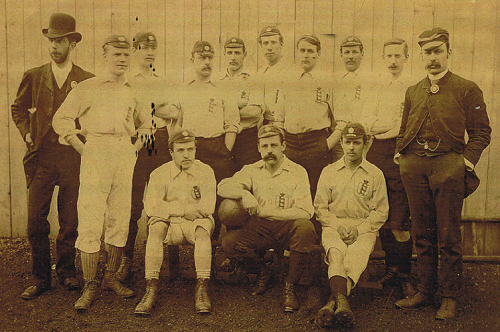|
Match Report
York Herald, Monday, 21 March 1887
|
|
The
sixteenth annual contest between
Association elevens representing England and this Scotland took place
at Blackburn in fine weather, and in the presence of a large
attendance. Owing to the recent bad weather the ground was very wet
and slippery, and, of course, considerably affected the play. England
won the toss, and Sellar started the ball for Scotland. The play at
the start was very fast, and within the first ten minutes each
goal-keeper had to save twice
 The Englishmen, who were playing in the
wind, pressed their opponents, and Cobbold sent in two fine shots,
which Macaulay, the Scotch goal-keeper, just saved A little later
Macaulay had to handle the ball repeatedly, and then McColl got right
away and scored a goal for Scotland after half an hour's play. Soon
afterwards Lindley made matters even, and at half-time the score stood�one
goal each. Within five minutes after changing ends 'hands' against
England was given, and from Kier's free-kick a goal resulted for
Scotland. The Englishmen played up splendidly, and directly afterwards
equalised matters, the goal being appealed against but allowed. Then
within a minute of the kick-off, Allan shot a third goal for Scotland.
The English team made a fine effort to save the game, and forced their
opponents to play on the defensive, Macaulay having to save shots from
Bambridge, Cobbold, and Bailey. Though hard pressed the Scotchmen
averted any further score, and the match ended in a victory for
Scotland by three goals to two. The Englishmen, who were playing in the
wind, pressed their opponents, and Cobbold sent in two fine shots,
which Macaulay, the Scotch goal-keeper, just saved A little later
Macaulay had to handle the ball repeatedly, and then McColl got right
away and scored a goal for Scotland after half an hour's play. Soon
afterwards Lindley made matters even, and at half-time the score stood�one
goal each. Within five minutes after changing ends 'hands' against
England was given, and from Kier's free-kick a goal resulted for
Scotland. The Englishmen played up splendidly, and directly afterwards
equalised matters, the goal being appealed against but allowed. Then
within a minute of the kick-off, Allan shot a third goal for Scotland.
The English team made a fine effort to save the game, and forced their
opponents to play on the defensive, Macaulay having to save shots from
Bambridge, Cobbold, and Bailey. Though hard pressed the Scotchmen
averted any further score, and the match ended in a victory for
Scotland by three goals to two.
|
|
Match Report
The Times, Monday, 21 March 1887
|
The Football
Association this year decided to play the international match with
Scotland at Blackburn. No more appropriate ground could have been
chosen, considering the keen interest that has been taken in the game
by the district and the skill shown there, a proof of which lies in
the fact that previous to this season the national competition had
been four times successfully carried off by Blackburn teams. Though
threatening in the early morning, the weather proved bright and
seasonable. This, however, had its drawback. The hot sun soon caused
the frost to disappear, and by the time fixed for the start the turf
was in an almost unplayable condition. Great preparation had been made
for the match, and special trains from Scotland and other parts
brought large numbers of visitors. It was estimated that there were
upwards of 12,000 people present. Both teams were thoroughly
representative. Within a few minutes of 3 30 the game was begun by
Sellars, England at first playing down the incline, with the wind at
their backs...
The home players again visited their rivals' half, but Arnott relieved
his side by a long kick, while M'Coll finished up a splendid run along
the left side and scored the first goal for Scotland. A very short
time had elapsed, when a combined rush by the forwards ended in
Lindley equalising matters...
M'Coll and Allan resisted this invasion, and a free kick fell to the
Scotchmen. This was undertaken by Keir with such judgement that the
ball was scrimmaged through, and Scotland scored their second goal.
Again the record was made level, Dewhurst scoring from a fine pass by
Bambridge. Directly afterwards Allan registered a third goal for the
Scotchmen; the last three points had been scored in less than five
minutes...
|
|
North British Daily Mail, Monday, 21 March 1887
|
The play was
very good considering that the men had to operate with a heavy and
dirt-laden ball...
Shooting was very difficult but Lindley and Bambridge were too slow in
getting rid of the ball. Cobbold was good, but Dewhurst has been seen
to better advantage, while the same might be said of the Walters
brothers...
The contest was a match between goalkeepers and Roberts
(England) fumbled twice and lost the match.
|
|
Daily Mail, Monday, 21 March 1887
|
A. M. Walters
handled the ball in trying to get it away, and Scotland had a free
kick in front of the home citadel. The ball was rushed down at the
forest of players round the goal, and seemed to pass all but keeper
Roberts, who fancied someone had touched it, and got his hand on the
leather but was charged through the goal, thus causing the
registration of the second goal for Scotland.
No sooner had the start been made from the centre than Dewhurst shot
the ball in, and Cobbold helped it past Macauley, an appeal for
offside being disallowed, and the scores were two each... |
|